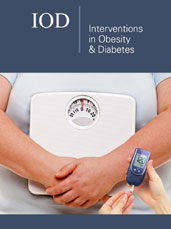- Submissions

Abstract
Interventions in Obesity & Diabetes
Severe Hypoalbuminemia Following Roux-En-Y Gastric Bypass in a Patient with Type 1 Diabetes
-
Open or CloseEva Christina Krzizek*, Johanna Maria Brix and Bernhard Ludvik
Department of Medicine 1, Rudolfstiftung Hospital, Vienna
Karl Landsteiner Institute for obesity and metabolic diseases, Vienna*Corresponding author:Eva Christina Krzizek, Department of Medicine 1, Rudolfstiftung Hospital, Vienna
Submission: May 01, 2020Published: June 02, 2020

ISSN : 2578-0263Volume4 Issue2
Abstract
Albuminuria in the context of diabetic nephropathy is a known complication of poorly controlled diabetes. Data of the Swedish Obese Study showed a reduction of albuminuria after bariatric surgery. On the other hand, Roux-en-Y gastric bypass carries the risk of protein malabsorption due to changes in the gut anatomy and physiology. In this case report we describe the results of a patient with both, diabetes mellitus type 1 and bariatric surgery. A 49-year old woman (height 157cm, weight 95kg, BMI 38.5kg/m2) with type 1 diabetes since 1983 underwent Roux-en-Y gastric bypass in 2005. She was admitted to our hospital due to generalized edema in December 2017. Routine check-up for bariatric patients was performed including blood tests after an overnight fasting and a urine sample. Amongst others HbA1c, creatinine, albumin and albumin-creatinine-ratio were evaluated. Yearly check-ups of these parameters were evaluated retrospectively since 1999. As expected, there was a significant weight loss after bariatric surgery (2005: 122kg, BMI 49.4kg/m2; 2007: 80kg, BMI 32.4kg/m2).
Diabetes control has always been poor (HbA1c 8.9% (1999), 8.7% (2005), 10.3% (2007), 10.8% (2017)). Diabetic nephropathy and retinopathy have been known since 1999. Albuminuria was present before bariatric surgery and got worse over the years (ACR 32.6mg/g (1999), 158mg/g (2005), 2246.4mg/g (2014), 1336.1mg/g (2017). Furthermore, hypalbuminemia has been present before surgery and deteriorated subsequently (albumin 29.0% (1999), 60.6% (2005), 32.2% (2012), 21.6% (2017)). In this patient, albuminuria unexpectedly worsened after Roux-en-Y gastric bypass despite weight loss, most likely due to insufficient metabolic control. Following surgery, decreased protein absorption contributed to the severe hypoalbuminemia resulting in generalized edema. Thus, patients at high risk for hypoalbuminemia, especially those with progressive diabetic nephropathy, need to be carefully evaluated preoperatively and be offered non-malabsorptive bariatric procedures such as sleeve gastrectomy, if indicated.
Keywords:Severe hypalbuminemia; Roux-En-Y-gastric bypass; Diabetes mellitus type 1; Macro albuminuria
 a Creative Commons Attribution 4.0 International License. Based on a work at www.crimsonpublishers.com.
Best viewed in
a Creative Commons Attribution 4.0 International License. Based on a work at www.crimsonpublishers.com.
Best viewed in 







.jpg)






























 Editorial Board Registrations
Editorial Board Registrations Submit your Article
Submit your Article Refer a Friend
Refer a Friend Advertise With Us
Advertise With Us
.jpg)






.jpg)














.bmp)
.jpg)
.png)
.jpg)










.jpg)






.png)

.png)



.png)






